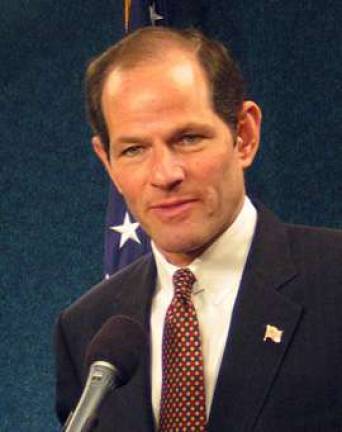Wise Guy: Eliot Spitzer on Journalism, Troopergate and His Criticisms of Cuomo

Eliot Spitzer needs no introduction. Since resigning as governor in March 2008, Spitzer has reemerged as a contributor to Slate magazine, an adjunct professor of political science at City College, and a television news commentator first for CNN and now for Current TV. Most recently he joined NY1?s Inside City Hall as one of the show's "Wise Guys." City & State Editor Morgan Pehme talks with Spitzer about his experience as a journalist, the return of Troopergate to the news and his criticisms of the Cuomo administration. The following is an edited transcript. City & State: How do you like your new gig as a Wise Guy? Eliot Spitzer: Two of the iconic forces in New York politics, Ed Koch and Al D'Amato, are a pleasure to joust with, chat with-they're full of stories and good humor, and the point of the show is to make a couple observations that are interesting here and there, but also just to have fun. CS: You have been a television news reporter for a couple of years now. What lessons have you taken away from the experience? ES: One realization that I think I had when I was on the other side, in government, is that the public's interest and the time spent and the capacity to get them to focus on issues is limited, and that is too bad, because you really want to dig down?and explain the intricacies and subtleties of an issue. On the other hand, it means there's a premium placed on getting to the point, articulating it with some edge, humor and creativity. And saying things in a way that the public will find persuasive-all of which sounds kind of obvious, but it means, get to the point, get there quickly, and say it with some depth. CS: Sometimes you have to make a tough pivot in your role as a journalist, like in your interview with Maria Bartiromo a couple of weeks ago. Initially you were talking about LIBOR as a commentator, and then she asked you about AIG as a participant. It seems like it can be a difficult space you have to negotiate. ES: It's not difficult for me. [Laughs] You're right; to an objective viewer it was a transition. [On the] LIBOR stuff I was there merely opining, [and] suddenly there I was, boxing gloves on, participating in the ring? I think it's fair to say they require different emotive approaches. CS: Another issue you were involved with in office that has reemerged recently in the news is Troopergate-and the Cuomo administration's attempt to withhold some of the documents pertaining to what occurred. Why do you think this is such a sensitive subject for the governor's office? ES: They'll have to answer that question, but what I can tell you was what I said throughout the period that the media focused on that. I said it was a scam based on a charade based on a misrepresentation. Darren Dopp, who was my press secretary, gave documents to the media pursuant to a FOIL that were public?that demonstrated accurately that Joe Bruno was misusing the plane, which I think was something the media had always focused on. They wanted the documents; they asked them for them. The governor's office?the AG's office-he was AG at the time-tried to portray that release of information as somehow being improper. The irony, of course, is that we were turning over what we believed was public information. As the record is imminently clear, I only had one conversation with Darren about it at the time. He said they had gotten a FOIL. I said, "Is it public information?" He said, "Yes." I said, "Then what choice do you have?" That was the extent of it. Now we see that this governor-then AG-has been trying to cover up information, withdraw it from archives, do whatever-I don't know the facts of that-it's a little bizarre, isn't it? It's a bit Alice in Wonderland, when you think about it. And of course, the record of Joe Bruno has now become clear. He was indicted, then convicted, now reversed on trial again. I don't follow this stuff any more. It's all rather mysterious to me. CS: You've been one of the foremost critics of the Cuomo administration, and the administration has in turn dismissed your criticisms by saying, "This is the pot calling the kettle black." Why have you felt it is important to be outspoken about the governor? ES: I don't view myself as a critic. I've said positive things about them when appropriate. I've disagreed with him. He's in a tough job. He's trying to do different things, so I don't criticize. When it comes to Troopergate, where I have intimate knowledge of having gone through that, I'll be critical to set the record straight? Beyond that, I try to be respectful of the office and say not a great deal, frankly. To read the full interview with Eliot Spitzer at City & State [click here. ](http://www.cityandstateny.com/back-and-forth-reflow/)